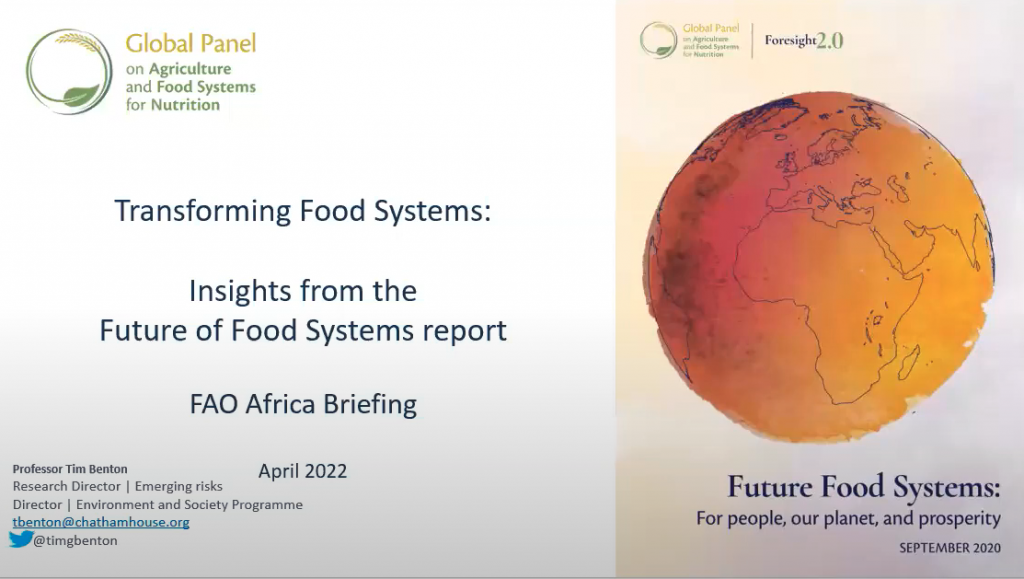Briefing for the Food and Agriculture Organization (FAO) Regional Office for Africa

’Future Food Systems – for people, planet and prosperity’, a briefing for the Food and Agriculture Organization (FAO) Regional Office for Africa.
On April 26, 2022, the FAO Regional Office for Africa (RAF) hosted a briefing to discuss the findings from the Global Panel’s Foresight report, Future Food Systems – for people, planet and prosperity, and how the Panel could support FAO-RAF in aiding the transition towards improving African food systems so they better provide universal access to sustainable, healthy diets. A recording of the briefing can be viewed below.
At the briefing session, moderated by Mr Yurdi Yasmi (Deputy Regional Representative for Africa, FAO-RAF), the attendees were presented with data and evidence from the report by Foresight 2.0 Co-Chair Professor Tim Benton. He highlighted how the world “is facing interlocking planetary crises of astonishing proportions” that is being driven by a fundamental mismatch between the food we grow and the food we need. This mismatch is harming our natural environment as well as our health.
“On a global basis, mortality from poor diets per year is six times greater than 2020 COVID-19 mortality”
– Professor Tim Benton, Co-Author of the Global Panel’s Foresight 2.0 report and Director of Environment and Society Programme, Chatham House
Professor Benton described how the “cheaper food paradigm”, at the heart of a market-led food system, creates vicious circles between diets and the environment. These are felt most by the poor and those living in fragile settings. This is a crucial issue given the cascading risks of de-globalisation, climate change and the conflict in Ukraine.
Professor Benton highlighted potential solutions for transforming the food system to benefit human and planetary health using the evidence-based recommendations from the Foresight report. These include:
- Repurposing subsidies to promote the affordability of nutrient-rich foods.
- Realigning food-based dietary guidelines, notably to include environmental outcomes.
- Leveraging public procurement to support access to healthy food choices.
- Rebalancing relative food prices through subsidies and taxes.
- Ensuring social protection policies protect the poor during food system transition.
- Revising trade policies to support rather than compete with other national agendas.
- Enhancing the role of science in government policy development.
“It is really important to push this change on the ground and you have provided scenarios, solutions and data”.
– Yurdi Yasmi, Deputy Regional Representataive for Africa, FAO-RAF
At the meeting the Global Panel and FAO-RAF agreed on the need to develop the dialogue and utilise their long-standing and productive relationship to develop realistic solutions that could support FAO and to help transition food systems across Africa so that they provide universal access to sustainable, healthy diets.
